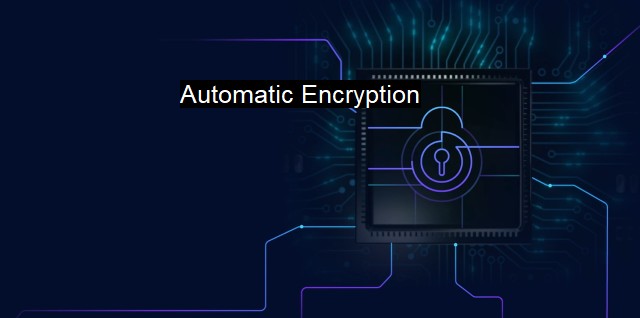What is Automatic Encryption?
Effortlessly Keep Your Sensitive Data Safe: The Importance of Automatic Encryption in Cybersecurity and Antivirus Protection
Automatic encryption is the method used in data encryption, encoding, storage, and transfer sessions, where the operation gets performed automatically without human intervention. Encryption isn't an optional psychology but a mandate in today's security-focused digital world. Given cybersecurity concerns and the critical role of antivirus software, every device and network that connects to the internet should employ the use of automatic encryption.Automatic encryption serves as one of the primary forms of data protection and cybersecurity mechanisms. It functions on a set protocol that is decided by system administrators or security professionals and subsequently runs on an automated working process. it transforms the open text format inside your devices, such as personal data or critical information, into a coded representation of the information. Anyone without the encryption key isn’t able to understand or interpret the jumbled-up data--thus, providing data security.
There are multiple reasons why automatic encryption holds immense significance today. First, the explosion of devices and interconnectivity of networks has led to a surge in instances of cyber threats and attacks. In this context, automatic encryption proves to be a powerful preventive measure. More so, encryption helps to maintain the confidentiality and integrity of data. It does not allow unauthorized intrusions to have readable access to data, making it harder for cyber threats to materialize and ensuring data remains unadulterated while traveling between servers or within the network.
Antivirus software, too, today is incorporating automatic encryption as part of its optimum security to fight against malware. Today, many antivirus programs come with advanced automatic encryption mechanisms that execute the encryption and decryption processes systematically. Known to use complex algorithms, such software incorporation ensures data stored, sent, received, or archived in a device remains out of reach from any potential threats.
Automatic encryption is user-friendly. Encryption may appear to be a complex algorithm-based operation, yet it does not need user expertise or monitoring once installed. With automatic encryption, users have been benefited, as security and discretion have been integrated into the functioning mechanism of devices and networks, minimizing human errors and establishing a continually protective environment.
Besides, automatic encryption plays a crucial role in protecting users against cyber-attacks in the context of electronic payments and transactions. Online banking and payments apps today are making heavy investments in their encryption capacities improving their algorithmic strengths and frameworks to ensure their client's sensitive information is guarded against detrimental interceptions.
Also worthwhile mentioning is the role that automatic encryption plays in regulatory compliance. Many sectors – notably finances, healthcare, and defense – face stringent legal and compliance requirements concerning data security. Encryption is now a mandatory requirement in these sectors, which seek to protect user information and other sensitive data. Automatic encryption solutions can help organizations readily comply with these regulations, as they continually and reliably encrypt data without any human intervention.
Automatic encryption, in today's world marred by cyber threats and attacks, is not only an excellent tool for safeguarding data confidentiality but also an indispensable aspect of the cybersecurity landscape. Its role is critical in fostering trust and building reliable digital environments, thereby amplifying the relevance of cybersecurity measures in current times.

Automatic Encryption FAQs
What is automatic encryption?
Automatic encryption is a security feature that automatically encrypts files or data when they are created or modified. This means that the data is converted into an unreadable format that can only be accessed by authorized users with the encryption key. Automatic encryption is often used in cybersecurity and antivirus software to protect sensitive information from unauthorized access.How does automatic encryption work?
Automatic encryption works by using an encryption algorithm to convert plaintext data into ciphertext. This process requires a unique encryption key that only authorized users can access. When the authorized user attempts to access the encrypted data, the encryption key is used to decrypt the data and convert it back into plaintext. The encryption and decryption process is automated, which means the user does not need to manually encrypt or decrypt their files or data.What are the benefits of using automatic encryption?
There are several benefits of using automatic encryption in cybersecurity and antivirus software. Firstly, automatic encryption provides an added layer of security, making it more difficult for hackers to access sensitive data. Secondly, it simplifies data management since users do not need to remember to manually encrypt their files every time they are created or modified. Finally, automatic encryption ensures that data remains secure even if it is lost or stolen, as the encryption keys are stored separately from the data.Is automatic encryption a foolproof security measure?
Although automatic encryption is a highly effective security measure, it is not entirely foolproof. If the encryption key falls into the wrong hands, the encrypted data can be decrypted and become vulnerable to unauthorized access. Additionally, some encryption algorithms have been known to be compromised, so it is important to keep up-to-date with the latest encryption standards to ensure the safety of encrypted data. It is also crucial to use strong passwords and enable multi-factor authentication to prevent unauthorized access to encryption keys.| | A | | | B | | | C | | | D | | | E | | | F | | | G | | | H | | | I | | | J | | | K | | | L | | | M | |
| | N | | | O | | | P | | | Q | | | R | | | S | | | T | | | U | | | V | | | W | | | X | | | Y | | | Z | |
| | 1 | | | 2 | | | 3 | | | 4 | | | 7 | | | 8 | | |||||||